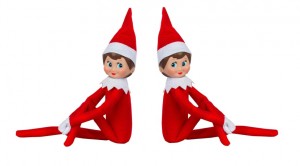You Better Watch Out: Big Brother and the Elf on the Shelf

Since writing recently about the troubling nature of the Elf on the Shelf tradition, I’ve learned that a researcher in Canada is exploring its dangers a bit further. For the uninitiated, the elf is a doll (based on a book) that parents put on a shelf to act as Santa’s eyes and ears, reporting to Santa on children’s behavior. Parents make the game more believable by moving the elf around the house at night when kids are asleep. In “Who’s the Boss? The ‘Elf on the Shelf’ and the Normalization of Surveillance” (published by the Canadian Centre for Policy Alternatives), Laura Pinto advises that this activity is more harmful than fun and could create a generation of children who are complacent when it comes to matters of government intrusion into personal privacy.
“The Elf on the Shelf essentially teaches the child to accept an external form of non-familial surveillance in the home when the elf becomes the source of power and judgment, based on a set of rules attributable to Santa Claus,” Pinto posits, describing a little girl who insisted her family ring the doorbell before they entered their own home to alert the elf of their return. Pinto’s fear is that instead of cultivating understanding with real people in the form of family, friends, teachers, and so on, children who participate actively in the Elf on the Shelf game learn to cater to an external authority and that this may lead them “to accept, not question, increasingly intrusive (albeit whimsically packaged) modes of surveillance.”
This may sound like a paranoid idea, but is it? It isn’t unrealistic to think that indoctrination is most effective among children and that anyone in a position of authority could exploit the innocence of a child’s mind to benefit themselves. Certainly children are indoctrinated with ideas about race and gender, and, of course, religion. Is encouraging kids to believe in a supernatural deity who watches them and judges their behavior the same thing as the Elf on the Shelf? Are children who believe in such a God more likely to accept a loss of privacy?
David Kyle Johnson, an associate professor of philosophy at King’s College in Pennsylvania, agrees that the Elf on the Shelf tradition is not good for children, and he has long argued the morality of the idea of Santa Claus, not only because the story is a lie but because it challenges a parent’s trustworthiness. In fact, some parents will go to great lengths to make their children believe a lie for their own benefit while completely disregarding their children’s skepticism. For example, this mother made a fake surveillance video of the elf flying around her children’s room while they slept to prove to her doubtful kids that the elf was real.
Johnson argues that the immorality of tools like Santa Claus and the Elf on the Shelf teach our children that if they behave they will receive a lavish gift that they “earned” simply for behaving the way everyone is expected to.
No matter if it is God, Santa, or an elf, the lies we tell children in order to elicit obedience create gullible and submissive adults hesitant to question or examine. Making someone believe something that isn’t real and promising rewards in order to make them comply—that is what the Elf on the Shelf is about. Replace the word “Elf” with “God” and “present” with” heaven” and the differences are hard to find.
